Elton John wasn’t always Elton John.
And we don’t mean that in the “it takes time for an artist to become a superstar” sort of way. No, he literally wasn’t always called Elton John.
Back before he was a global icon who’d entertained the world with hits like “Your Song” and “Candle In the Wind” and lived a life outsized enough to inspire a musical fantasia of a biopic like Rocketman, before he’d won any of the Grammys or Oscars or Tonys he’s racked up during the course of his illustrious career, back before he’d ever even sat down and tinkled any ivories, he was merely Reginald Kenneth Dwight, a little boy growing up in his maternal grandmother’s council home in post-WWII London.
Born to a mother and father who never seemed to have quite enough love for one another—and conflicting ways on how to show love to their young son—little Reg’s experiences as a youth weren’t particularly colored with warmth. As the adult Elton has sworn up and down for years, his father, Stanley Dwight, an officer in the Royal Air Force Naval Reserve, was never there. And when he was home during breaks from service overseas, things weren’t that much different.
“I was two years old when he came home,” Elton was quoted to have said in Philip Norman’s 2001 tome Sir Elton: The Definitive Biography. “Mother said, ‘Do you want to see him?’ He said, ‘No, I’ll wait till morning.’ He’s been in Aden or somewhere, and he came home after two years, after not seeing me born or anything.” While Stanley was serving as a flight lieutenant in 1947, when his wife Sheila was pregnant, and frequently away, records indicate that he actually was on a home posting at the time of the birth, registering Reggie’s birth the day after it occurred. Stationed at Ruislip, he would return home to his wife and son each night after work for the first year and a half of Elton’s life, same as any common commuter. It was only until 1949, when he received a two-year post in Basra, Iraq, that Stanley was away from his young family for a prolonged period of time.
While Elton’s recollection of years he was certainly too young to have any memory of his own about remains shaky, there’s no denying how those years made him feel. According to Elton, Stanley was a strict disciplinarian, imposing rule after draconian rule on the boy, apparently determined to make sure his son never made a sound. (One legend has it that little Reg was too afraid to even bite into a stalk of celery for fear that Stanley might object to the crunch.) And then there was, according to the superstar, the withholding of love.
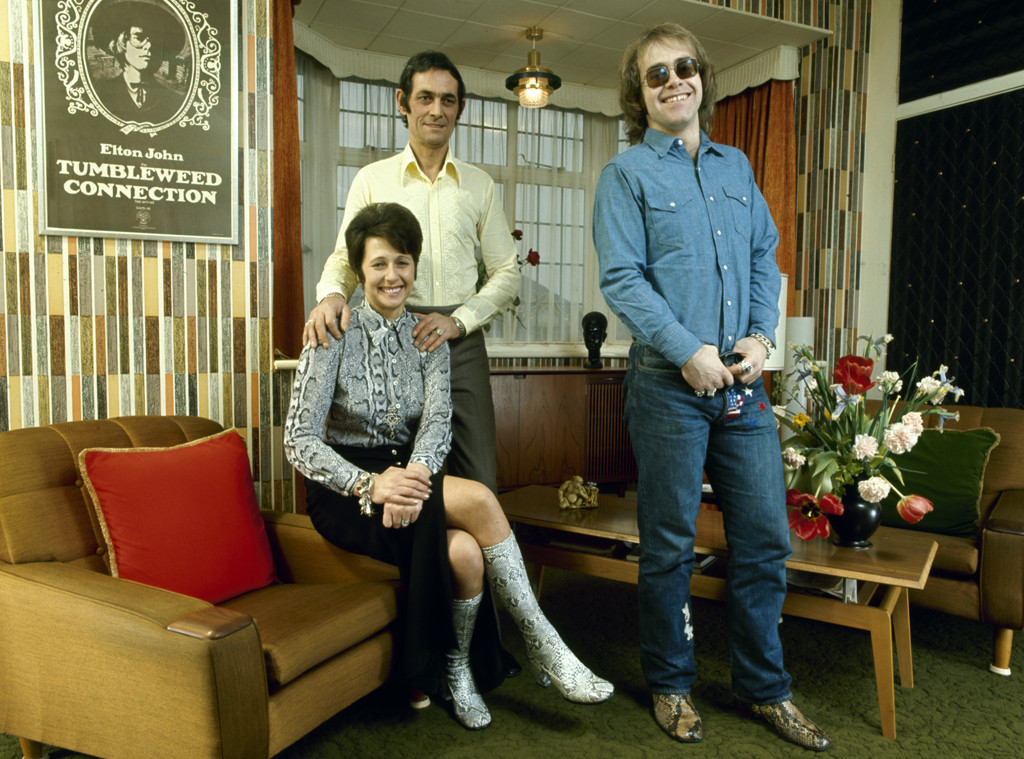
John Olson/The LIFE Picture Collection/Getty Images
“I blamed a lot of my lack of self-esteem on him, my problems with weight, my glasses – all these things which are so rooted in your childhood and never go away,” he told the Daily Mirror in 2011. “I always wanted my dad to hug me and tell me he loved me. He didn’t but he loved me in his own way.”
Despite an opportunity for the Dwight family to live as one when little Reggie was six years old and Stanley had been stationed long-term at the Headquarters Signals Group at RAF Medmenham in Marlow, Buckinghamsire, the gulf between Sheila and her husband had grown too wide during their time apart. The fighting was terrible, and took its toll on their son.
“I suppose my mum and dad must have been in love once, but there wasn’t much sign they ever had been by the time I came along,” Elton wrote in The Guardian in May. “They gave every impression of hating each other. My dad was strict and remote and had a terrible temper; my mum was argumentative and prone to dark moods. When they were together, all I can remember are icy silences or screaming rows. The rows were usually about me, how I was being brought up.
“I really value the fact that they stayed together for me when they were unhappy with each other, although I hated it,” he told Variety in early May, relying on the wisdom that only highsight and age can offer. “I’m glad they found love in other marriages. I’ve come to understand—as you get older, you under the circumstances they went through. And I’m not angry or bitter about that whatsoever, but they did leave a scar. And that scar takes a long time to heal. And maybe it will never heal totally.”
By the time he was 14, they’d split, with Sheila and her son moving back in with her mother. They’d both remarry, Sheila to a local painter name Fred Farebrother (whom his stepson would come to affectionately call Derf, his name in reverse) and Stanley to Edna, a former lab assistant who quickly gave him four sons.
And it was watching Stanley navigate fatherhood with his new family that convinced Elton that perhaps the issue the “tough, hard, unemotional” father had was not with all children, but instead was simply with the first son he’d been given. “It wasn’t that he didn’t know how to relate to kids,” Elton told The Sunday Times in 2011. “He left us, remarried and had another family, and by all accounts was a great dad to them. It wasn’t children, it was me.”
Luckily, young Reggie had a world of his own design to disappear into.
The family legend goes that at the tender age of three, his beloved nan Ivy set him at the family piano and encouraged him to pluck away at the keys. One day, he stunned his mother by playing the melody of “The Skaters’ Waltz” by ear. Even as a toddler, it seemed, Reggie could hear a piece of music once, sit down at the piano, and play it back without missing a note, a preternatural musical ability if there ever was one. By six, he was taking formal piano lessons and, by 11, he’d won a junior scholarship to the Royal Academy of Music.
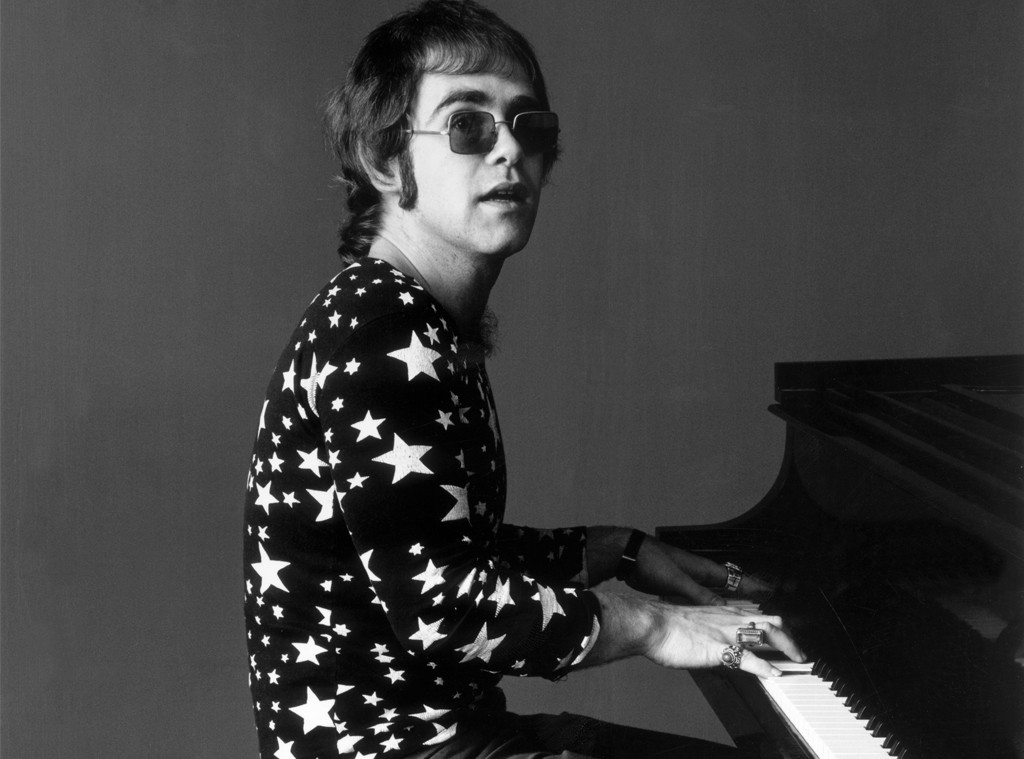
Jack Robinson/Hulton Archive/Getty Image
As Helen Piena, the sub-professor at the Academy who taught him every Saturday for the next four years, said in Norman’s biography, “I remember once playing him a prelude by Handel, four pages long. As soon as I’d finished, he played it straight back to me just like a gramophone.”
The only problem? The music he was learning at the Academy was out of step with the rising world of rock and roll. “I didn’t want to be a classical musician,” he told NPR‘s Terry Gross in 2013. “But I went to school Monday to Friday, and from the age of 11 to 15, I was—went to the Royal Academy on a Saturday morning in London on Marylebone Road. And I had played classical music. I mean, I played classical music before I went to Royal Academy because you had to play classical music to get in there. And it was a great experience, even though it was—in the ’50s it smelt of fear. I mean, it has a whole new, different feeling now. You have to realize that Elvis Presley kind of only just happened there. So there was – it was a really, really very strict and severe place. But I went there, and I met a lot of friends who subsequently have had a huge impact on my recording career.
“Looking back on it now, those five years spent there were invaluable to me because I learned so much. It had a huge effect on the way I wrote, the way I constructed chord sequences, and it’s just a wonderful place to be,” he continued. “And after all that time of being so fearful and afraid of going on a Saturday morning because if you got something wrong, you were told and rapped over the knuckles, that now, 40-odd years, 50 years later, it’s the most wonderful place to be, and I have a wonderful relationship with it.”
A bit of a different tune from the one he was singing with Rolling Stone back in 1973. “I heard Little Richard and Jerry Lee Lewis and that was it. I didn’t ever want to be anything else. I just started banging away and semi-studied classical music at the Royal Academy of Music but sort of half-heartedly,” he told the music publication three years after his breakthrough. “I was never really interested in it.” Ah, how time and distance changes our views on things.
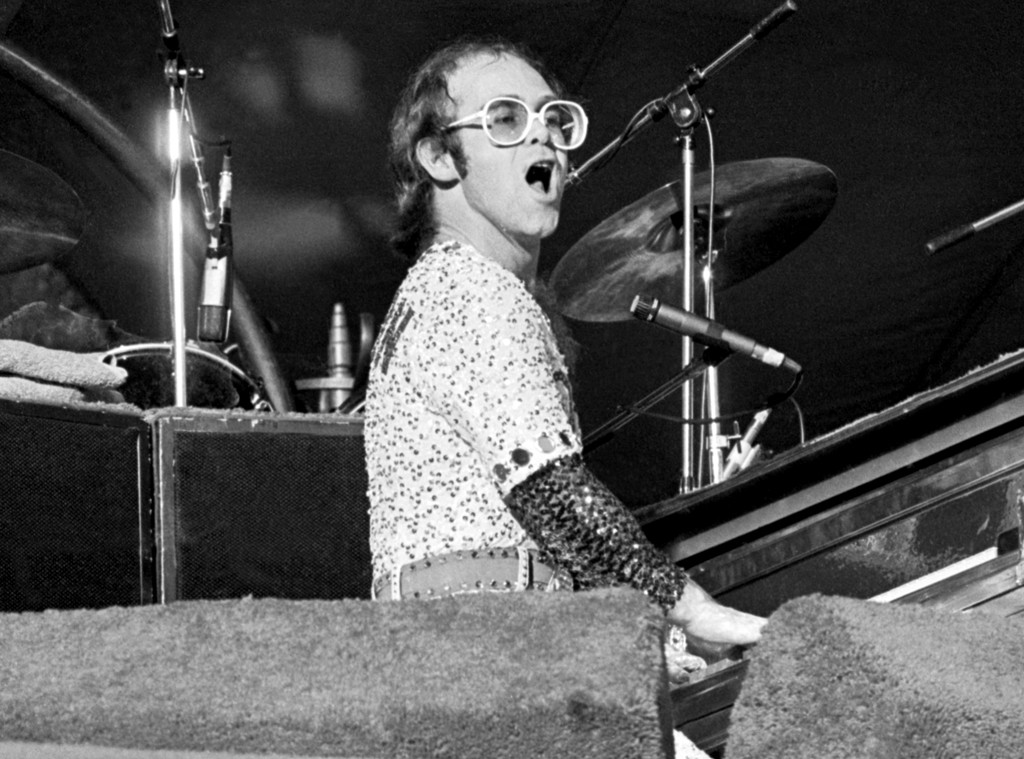
David Warner Ellis/Redferns
While regular school was never much of a priority, Saturdays at the Academy left him in fear, and home life wasn’t all that great until his parents’ divorce, Reggie had his records to lose himself in. “The best way to escape it was to shut myself in my bedroom with my record collection and my comics, and drift off into an imaginary world, fantasizing that I was Little Richard or Ray Charles or Jerry Lee Lewis,” he wrote in The Guardian. By 15, he was the weekend pianist at a nearby pub, the Northwood Hills Hotel, and in 1962, he’d formed a band called Bluesology. By the mid-’60s, the band had begun backing touring American soul and R&B musicians like the Isley Brothers and Patti LaBelle. “Looking back on it, it was the most miserable existence, but at the time it was quite happy,” he told RS in ’73. In 1966, they became musician Long John Baldry‘s supporting band.
“I said, well, at least it’s a step in the right direction. So we backed John for a year, starting off with a soul package, really,” Elton explained. “It really didn’t ever get off the ground, we were never a success, so Baldry decided to make a commercial record and made a hit record with Let the Heartaches Begin. That changed his life for two or three years and began to change mine, because it meant instead of playing in clubs you played in cabaret, which really drove me around the bend. I think that’s the graveyard of musicians, playing cabaret. I think I’d rather be dead than work in cabaret.”
Ready to change things up within a year, he responded to an advertisement in the New Musical Express announcing that Liberty Records was looking for singers and talent. “I didn’t know what I was going to do, I just knew I wanted to come off the road. So I went up for an appointment, I was still with the band,” he told Rolling Stone. “I said I can’t write lyrics and I can’t really sing well because I wasn’t singing with Bluesology, But I think I can write songs. So they gave me this audition, it was in a recording studio; they said ‘sing us five songs.’ I didn’t know five songs, all I knew were the songs Baldry was singing and the Jim Reeves records I used to sing with at home. So I sang five Jim Reeves songs and they turned me down flat. I don’t really blame them.”
Ray Williams, then the A&R manager for Liberty and the man whom Elton, still going by Reggie at this point, met with, threw him a bone, however. “He said, well, here’s somebody who writes lyrics who’s just – you know, he had a – piles of stuff on his desk – tapes, lyrics,” Elton told NPR. “But it was in a brown envelope, and I took it home. And that was Bernie.”
That would be Bernie Taupin, a lyricist in search of a songwriter to bring his words to musical life. The two met and a partnership, brotherhood, dear friendship, you name it, that endures to this very day began.
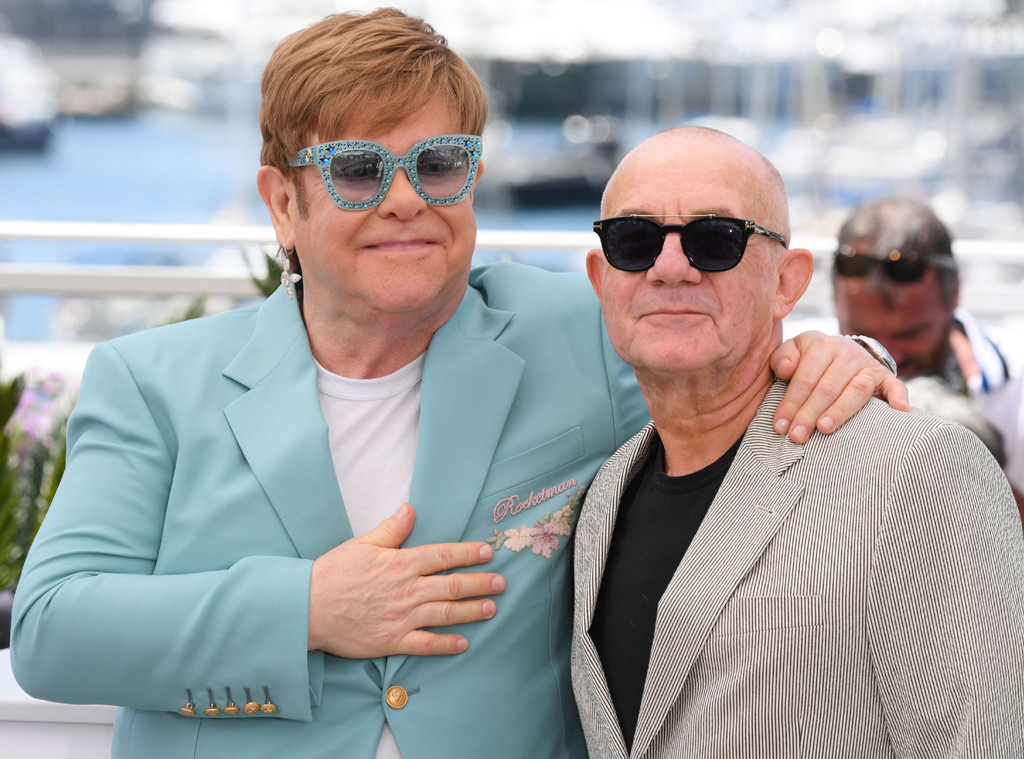
David Fisher/REX/Shutterstock
It was then that a name change began to take shape, as well. “I said, ‘I’ve got to think of a name. I’m fed up with Reg Dwight I can’t be Reg Dwight if I’m going to be a singer, so I’ve got to think of a name,'” he told Rolling Stone. “So Elton Dean‘s name I pinched [Elton Dean was in Bluesology and later the Soft Machine.] and John Baldry’s name and I said, oh, Elton John, there you go.” He had his name legally changed to Elton Hercules John in 1972.
While Elton and Bernie were building their songwriting skills, working at Dick James‘ DJM Records as staff songwriters, Elton, still struggling with his sexuality, found himself engaged to a secretary named Linda Woodrow. “It was a very stormy six months, after which I was on the verge of a nervous breakdown. I attempted suicide and various other things, during which Bernie and I wrote nil, absolutely nothing,” he told RS. “It was a very Woody Allen-type suicide. I turned on the gas and left all the windows open.” According to Bernie, Elton’s head was resting in the oven on a pillow.
Eventually, it was his namesake John Baldry who convinced him, during a night of drinking, that he didn’t love Linda. “He was saying, ‘She beats you up, she smashes you on the face,’ and we got more and more depressed sitting there until four in the morning setting off burglar alarms when we staggered out and I shouted, ‘It’s over, it’s finished!’ and then came a couple of days of hell,” he told the publication. “In the end my Dad came with his Ford Cortina and how he managed to cram all that stuff in there I don’t know and my mother said, ‘If you marry her I’ll never speak to you again’– oh, it was just amazing. So she [Linda] sued me for breach of promise and all that s–t. She got away with quite a lot of money in shares.”
Slowly, Elton and Bernie began writing music intended for the fomer to record and by 1969, an album had been released. A year later, they followed Empty Sky up with the self-titled Elton John and an idea was hatched: Elton would travel to Doug Weston‘s famed Troubadour in West Hollywood, Calif. for a series of shows that would literally change everything. “I left England in August 1970 more or less unknown. Me and Bernie were so broke, we were sleeping in bunk beds in my mum and stepdad’s spare room,” he wrote in The Guardian. “I was making ends meet working as a session musician, playing on anyone’s records. I’d had a little bit of press and a few plays on John Peel for my second album, Elton John – enough that I didn’t see the point of going to perform in America, where literally no one knew who I was. But I came back from the States a month later with American critics calling me the savior of rock’n’roll.”
He wasn’t exaggerating.
After earning an introduction from none other than Neil Diamond, done as a favor, Elton took the stage and came to life in front of a room full of heavyweights including T Bone Burnett, Linda Ronstadt, Quincy Jones, Brian Wilson, Randy Newman, and, perhaps most importantly, Los Angeles Times critic Robert Hilburn. “I’d never heard of Elton until I started getting calls from UNI Records,” the critic recalled to the Times in May. “Russ Regan or Norm Winter called me every day for six or seven days. ‘Hi, it’s Norm.’ ‘Jesus, Norm…’ ‘This guy’s got the same publisher as the Beatles.’ I didn’t care who the publisher was. I might’ve said, ‘I’ve got something else to do that night,’ just to freak them out. I was gonna be there regardless. I went to the Troubadour every Tuesday. It was the most important club in the country. Elton could have killed his career in one night.”
He did not. “Rejoice!” Hilburn wrote in his emphatic review. “Rock music has a new star.”
“Once Hilburn’s review hit the streets, it was a sellout for the rest of the week,” Bernie told the Times.
As Elton wrote in The Guardian, “Artists who were just mythic names on the back of album sleeves to me, people I absolutely worshipped, were suddenly turning up in the dressing room to tell me and Bernie they loved what we were doing: Brian Wilson of the Beach Boys, Leon Russell, the Band, Bob Dylan. I’d also lost my virginity, to a man – John Reid, who later became my manager – and come out as gay, at least to my friends and family. This all happened in the space of three weeks. To say it was a lot to take in is a terrible understatement.”
Life for Elton was never the same. He and John carried out a secret relationship for five years, while he acted as Elton’s manager until 1998. (Coincidentally, John’s second client was none other than Queen, whom he managed from 1975-78.) Everything he and Bernie wrote turned to gold. Throughout the ’70s, he released 13 Top 10 albums, seven of them reaching No. 1. Onstage, he’d introduced a flamboyance never quite seen before, sequin by sequin. And off, the excesses of stardom began to creep in. Namely, the drugs and the drink.
Despite all the success and the affection, all of his insecurities never quite went away. “I never thought of myself as being handsome or good-looking or whatever,” he told The Telegraph in 2010. “I always felt like an outsider. And I think that’s why I started doing drugs, to be one of the gang.” Cocaine, he claimed, came into the picture in 1974, when he was recording Caribou in Colorado.
“I walked into one of the back rooms in the studio, and there was my manager and a couple of other people with this white powder in a line, and I said, ‘What on earth is that?’ They said, ‘Cocaine,’ and I thought, ‘Hmmm. Can I try some?'” he continued. “Listen, I was so naive I didn’t even know my band smoked joints and they were the biggest pot-heads in the world. And I thought, I’m one of the boys now.” The cocaine use led to drinking.
“I was never really that big a drinker until I started doing blow,” he told Rolling Stone in 2011, “and I drank just to come down off the blow.”
By November 1975, in the midst of Elton John Week in Los Angeles—he played a series of concerts at Dodger Stadium and was given a star on the Hollywood Boulevard Walk of Fame—he made another attempt on his life at his Bel-Air mansion, swallowing 60 Valium pills and jumping into his pool in front of both his mother and grandmother, screaming, “I’m going to die.”
“It was stress,” he told The Telegraph. “I’d been working non-stop for five years. But it was typical me. There was no way I was going to kill myself doing that. And, of course, my grandmother came out with the perfect line: ‘I suppose we’ve all got to go home now.’
“And then two days later I was playing Dodger Stadium, and Cary Grant was there, and it was one of the best days of my professional life and I pulled it off,” he continued. “I’ve got that resilient thing inside me. But I wasn’t a happy bunny.”
But resiliency can only last so long.
After admitting to being bisexual in a 1976 Rolling Stone interview, album sales started to slip and Elton’s excesses only grew more severe. And along the way, he picked up a few new ones, including a dangerous bout of bulimia. By the time the ’80s rolled around, he was doing enough cocaine to warrant comparisons to vacuums. “George Harrison used to say, ‘Go easy on the marching powder.’ I spent a lot of late nights with my contemporaries,” he told Rolling Stone in 2011. “I remember being with George at eight in the morning [laughs]. The sun was coining up, so I said, ‘You know what, would you play ‘Here Comes the Sun?’ And he did! And it was pretty amazing! It was fun sometimes. It was an aphrodisiac for me. But the last two weeks I was using it alone in my bedroom. The blow brought out the dark side of my soul.”
While his success had given him a sort of freedom that he’d been longing for in his youth, the drugs dragged him back down into those murky depths. “I must have an alcoholic personality,” he told the L.A. Times in 1992. “Whenever anything has gone wrong, I’d run away from it. When everything happened to me in 1970, I was just a little boy in many ways…and you can see that in the old photos. Suddenly, I could dress how I wanted. I could do what I wanted for the first time in my life. I felt as if I were free, and to a certain extent I was, but as soon as I started taking the drugs, I became a prisoner again of my old thoughts again…insecurities and doubts. I couldn’t deal with all the emotions it brought up.
“Despite all the success, I think I just wanted to be loved,” he continued. “I wanted someone in my life to love me.”
So, in 1984, he surprised everyone and married Renate Blauel, a recording engineer he’d met while recording an album in London. The wedding occurred on Valentine’s Day while he was on tour in Australia. “We just clicked,” he said later that year. “It was the first time I met anybody in my life that I wanted to marry.” Speaking of children, he added, “I’d like to have two because I grew up an only child.” The marriage lasted four years. It produced no offspring.
“Even though I knew I was gay, I thought this woman was attractive and that being married would cure me of everything wrong in my life…And my wife did love me,” he told the Times. “But it didn’t change my way of life. I wasn’t a sexual philanderer during that time, but I certainly didn’t stop taking drugs and alcohol, and when you take that amount, you can’t have any relationship.In the end, we ended up in this big house with (separate bedrooms), never seeing each other. It was very sad…I wasn’t being honest.”
After becoming engrossed with the story of Ryan White, a teenager whose battle against AIDS made headlines when his family filed a discrimination suit against their local Indiana school system in 1985 after he was barred from attending classes, as the other parents feared their children would become infected if he were permitted to attend school, he became one of the celebrities who offered Ryan comfort in his final days before his death at 18 in April 1990.
“I was pretty screwed up at the time…getting angry at the littlest thing,” he told the newspaper. “I couldn’t believe that a family who had had so much hatred flung at them and so much bigotry could be so forgiving. I never experienced that before…that amount of love. And it felt good (for me to) be able to contribute. For that week or so I didn’t do any drugs or drink. I was too busy organizing things and trying to help.”
It was a short time later, when Hugh Williams, a lover and fellow addict decided to check himself into rehab that Elton began to consider the possibility of turning his life around. First, though, he was angry. “I thought, ‘God, can’t you sort your own problems out?'” he recalled. “But that’s the way I was. I thought anybody who couldn’t sort out their own problems was weak.”
After returning to the Arizona clinic Hugh had checked himself into for a second time, the two saw a counselor to discuss their relationship. While there, they were instructed to draw up a list of complaints about each other.
“He wrote out this list about me first, and it nailed me for drugs, drink, sexual activity…and bulimia, which I didn’t even know that he knew about,” he explained. “I was shaking and he was shaking because he thought I was just going to walk out the door. But I stayed and showed him the list I had made for him…and it had things on it like ‘He does not put his compact discs away neatly.'”
Elton sought out treatment, only to discover that no clinic or hospital in Los Angeles he’d tried would treat him because they wouldn’t accept patients who needed help for both drugs and bulimia. “I couldn’t believe it,” he said. “I was thinking, ‘You mean, I finally decide to seek help and they’re telling me no one will accept me?'”
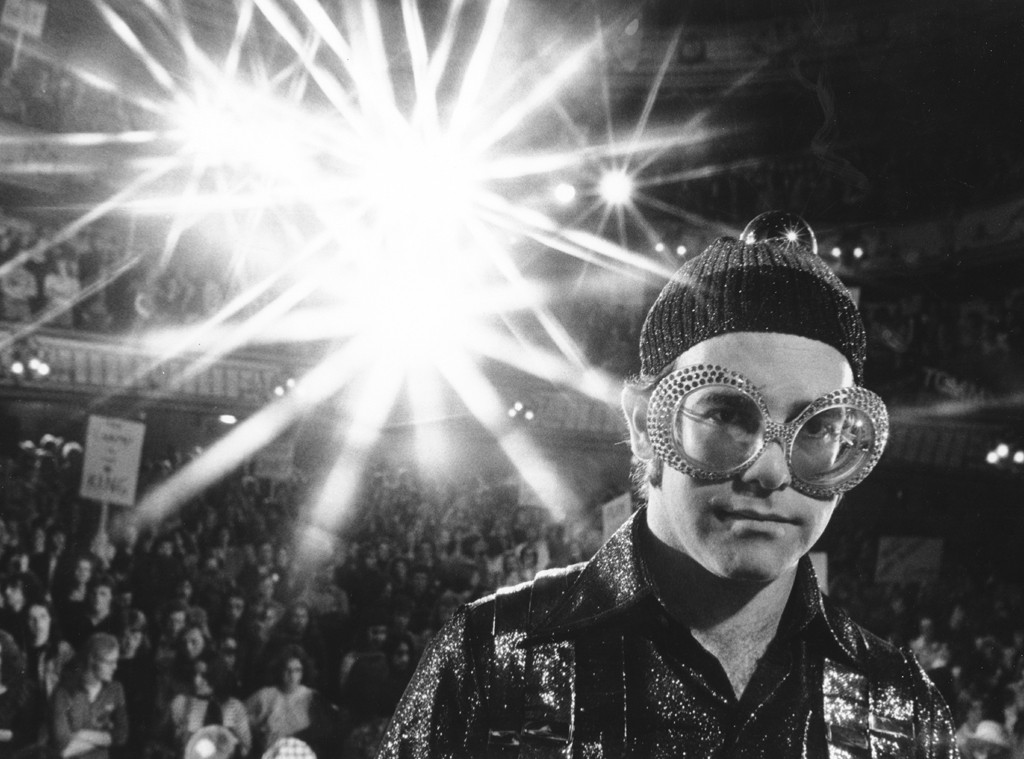
Michael Ochs Archives/Getty Images
He eventually found a hospital in Chicago that would treat him, checking in on July 29, 1990. “I tried to run away twice because of authority figures telling me what to do. I didn’t like that, but it was one of the things I had to learn . . . to listen,” Elton told the Times. “I packed my suitcase on the first two Saturdays and I sat on the sidewalk and cried. I asked myself where I was going to run: ‘Do you go back and take more drugs and kill yourself, or do you go to another center because you don’t quite like the way someone spoke to you here?’ In the end, I knew there was really no choice. I realized this was my last chance.”
After completing treatment, it was time for Elton to build a whole new life. “Until I got sober in 1990, I really hadn’t grown up at all. So when I did get sober, at that point, I had a lot of catching up to do with the personality onstage, with the real person offstage,” he told NPR. “And to attain the balance in my life, I had to learn to walk again, basically. I had to learn how to function as a human being, and I really enjoyed that process. I mean, when people go to rehab and come out, they go through a difficult period, a lot of people; I never had that. I was so glad to be rid of all that crap, that, for me, to learn again and to function as a human being and learn how to participate in the human race again was just pure joy.”
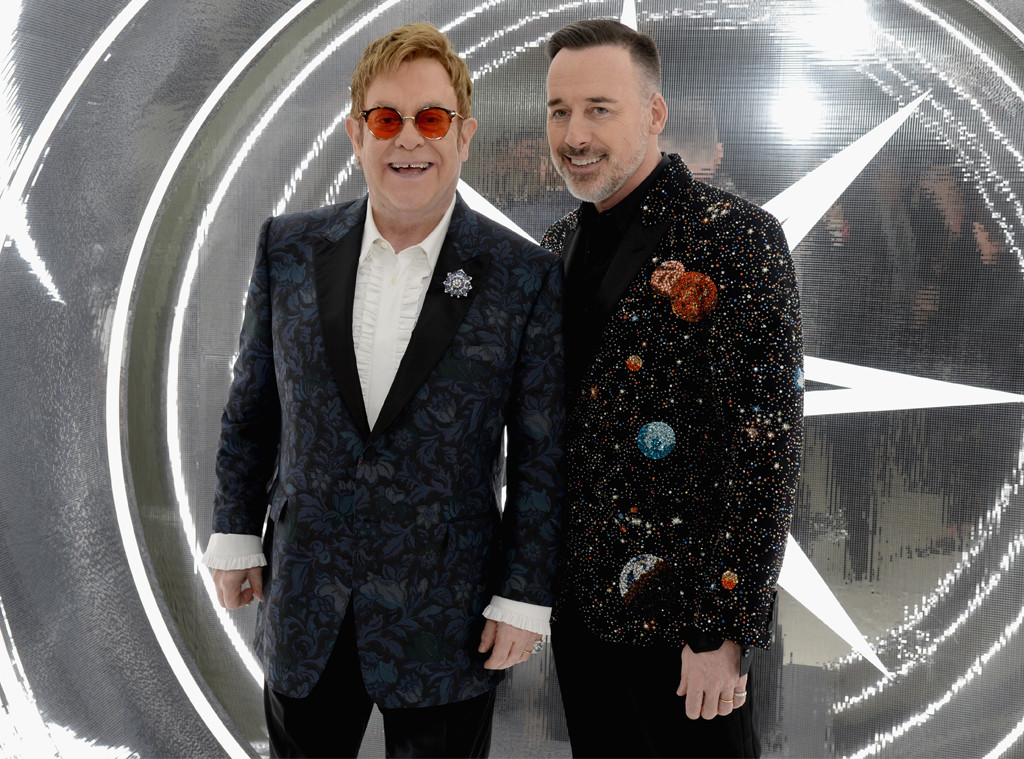
Jamie McCarthy/Getty Images for EJAF
And once he had, great things began to come his way. “In 1993, I met my partner, David [Furnish],” he continued. “In 1993, I did The Lion King. So great things came my way. But I met someone who was willing to be in a relationship, but only if it was a 50-50 relationship. Before I had the relationship with David, you know, I tended to take hostages.”
In his new sober lifestyle, Elton was wanting to meet new people to help build a new social life that would support it. “So I rang up a friend in London and said, ‘Could you please rattle some new people together for dinner here Saturday?'” he told Parade in 2010. David was one of those who turned up. Expecting the evening to be a bore, he was surprised to find Elton much more human than anticipated.
“I was attracted to David immediately,” Elton admitted. “He was very well dressed, very shy. The next night we had dinner. After it, we consummated our relationship. We fell in love very quickly.”
They moved in together after three months, during which time Elton never visited David’s flat. “Our lifestyles weren’t compatible at all,” David told The Observer in 2001, laughing. “I don’t know if I could have seen him coming around to Clapham for a bowl of spaghetti bolognese.”
“if I’m being totally honest, the balance of power was different to the way it is now. Everything was so new to me. I was still adjusting to his needs versus mine, and the inevitable… well, sacrifices and compromises,” he continued. “When you’re in a relationship with a very famous person, you HAVE to make compromises. I can’t say to Elton, ‘Hey, let’s walk around the corner and have a coffee.” Someone as well-known as that can’t go anywhere in the world without being recognized. Elton has written the soundtrack to a lot of people’s lives, so they feel a kinship with him, so they come up, and that does color things. When there are too many people, he gets quite claustrophobic, scared in a way. So in the early days of the relationship, I was learning, feeling my way, more deferential. Whereas now I have a much better understanding of what he can and can’t do, and if something’s possible and he doesn’t want to do it and it’s important for me, well then, I’ll make sure he does it.”
By 2005, when the Civil Partnership Act went into effect in the United Kingdom, they were among the first couples to form one. And after gay marriage was made legal in England in 2014, they were married on December 21 of that year, marking the ninth anniversary of the civil partnership. By that time, they’d already welcomed two sons via surrogacy, Zachary in 2010 and Elijah in 2013.
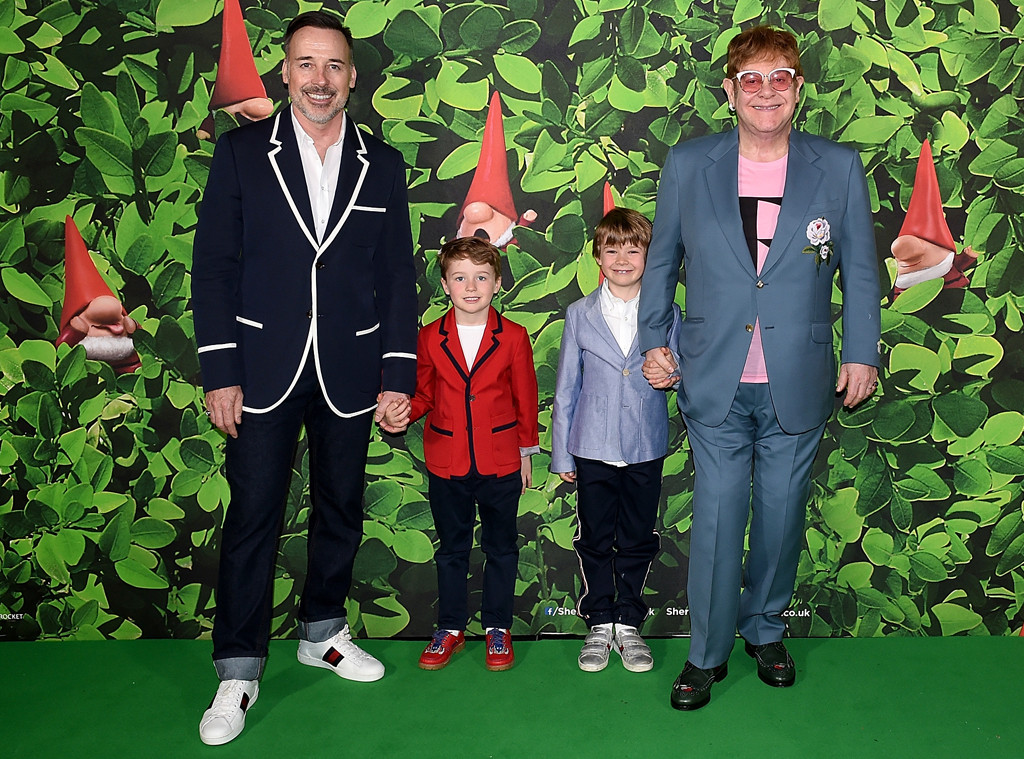
Stuart C. Wilson/Getty Images for Paramount Pictures
“I always said no to having kids, because I’m too old, too set in my ways, too selfish, the lifestyle doesn’t suit me,” Elton told Rolling Stone in 2016. But after becoming attached to a Ukranian boy named Lev while visiting an orphanage for HIV-positive children in 2009, and having their attempt to adopt him denied by the government who deemed them too old and gay, that all changed. “I said, ‘This boy we met was trying to tell me something.’ He was trying to say, through God or someone else, ‘Bulls–t, you can be a dad, look at how much pleasure I gave you in an hour and a half.’ And I said, ‘Let’s go for it.’ God, that was the best decision.” Elton added that he and David still provide for Lev and his brother, as well. “We got him to the grandmother, and we surreptitiously look after them,” he added.
“Years ago, I didn’t have anything,” Elton told the magazine. “I wanted to die on the stage. That’s all I had. Now I don’t. I’ve got children. I want to come off the road. I want to be there, I want to take them to baseball, I want to take them to soccer games. My life is completely changed.”
To that end, with an astounding 30 studio albums in his rearview mirror (not to mention the countless collaboration albums, soundtracks, and scores he’s created), he’s retiring into the last phase of his life. A three-year farewell tour is expected to wrap up with its English leg in 2021. Rocketman, starring Taron Egerton in the leading role, seems poised to keep his music alive in new and exciting ways. (Look for it to make its way to Broadway as a stage show within the next five years. Just a prediction.) His first, official autobiography is on its way in October. And his philanthropy, through the Elton John AIDS Foundation, has raised over $400 million to support HIV-related programs in 55 countries.
When asked by Variety what little Reggie Dwight would think of all he’s accomplished, Elton gushed, “I think he’d be very happy for me. I have a wonderful life now, but I had to change it. I had to change my life really drastically, otherwise I wouldn’t be sitting here talking to you. I had a choice, and I made the choice. And it was the right choice.”
And because of it, he’s still standing after all this time. Better than he ever did.
Rocketman is in theaters now.
